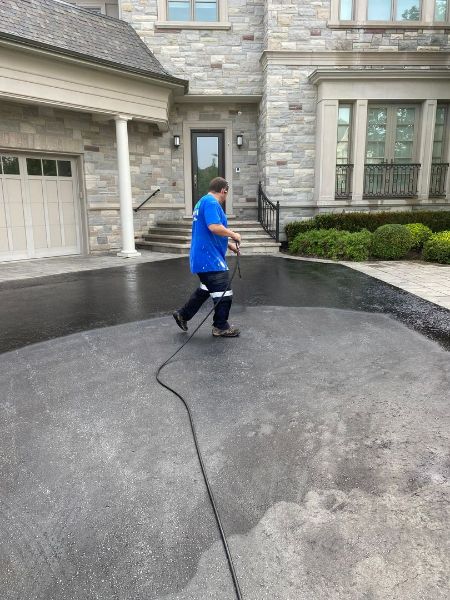Guard Surface Areas with Expert Asphalt Sealing: Cold Mix Fundamentals
Guard Surface Areas with Expert Asphalt Sealing: Cold Mix Fundamentals
Blog Article
Cold Mix Asphalt Vs. Hot Mix Asphalt: Which Is Right for You?

Make-up Differences
Cold mix asphalt is generated by emulsifying the asphalt binder with water and an emulsifying representative prior to mixing it with aggregate. The warm mix asphalt manufacturing procedure entails heating the aggregate and asphalt binder individually before integrating them at the asphalt plant.
Additionally, cold mix asphalt tends to be less dense and more versatile than warm mix asphalt. This adaptability makes it far better matched for locations with greater degrees of activity, such as driveways or roadways with rush hour. On the other hand, warm mix asphalt is recognized for its high durability and resistance to rutting and splitting, making it a recommended choice for freeways and high-traffic roadways where longevity is crucial.
Installation Process Variances
The process of mounting cool mix and warm mix asphalt displays significant differences in their needs and procedures. In contrast, warm mix asphalt demands a more sophisticated installment process. Due to the heating demands, warm mix asphalt installments are usually lugged out by specialists with specialized devices, making sure an extra structurally sound and irreversible result.
Toughness and Long Life Factors
When thinking about asphalt options, resilience and longevity are crucial variables to examine for long-term pavement efficiency. Hot mix asphalt (HMA) is understood for its remarkable longevity and longevity.
In regards to longevity, HMA commonly outmatches CMA because of its exceptional toughness and resistance residential or commercial properties. HMA sidewalks have a longer solution life, requiring much less frequent fixings and maintenance, which can convert to cost financial savings in the future. Additionally, HMA sidewalks are more conveniently personalized to meet details job needs, further enhancing their sturdiness.
Cost Factors To Consider
Taking into consideration the monetary effects is a crucial facet when examining the option in between hot mix asphalt (HMA) and cold mix asphalt (CMA) for pavement tasks. While the first cost of warm mix asphalt is typically greater than that of chilly mix asphalt, HMA often supplies a more economical remedy in the lengthy run due to its superior resilience and longevity.
In enhancement to material prices, it's essential to think about the expenses connected with installation and maintenance when contrasting HMA and CMA. Eventually, the choice between HMA and CMA must take into account not just the preliminary price however also the long-lasting economic implications to establish the most affordable alternative for the particular sidewalk job.
Environmental Influence Contrast
Comparison of the ecological influences between hot mix asphalt (HMA) and cool mix asphalt (CMA) reveals unique distinctions in sustainability practices. HMA production needs high temperature levels, resulting in boosted power consumption and greenhouse gas emissions. The procedure additionally launches volatile organic compounds (VOCs) and harmful air toxins (HAPs) into the atmosphere. In contrast, CMA is created and used at lower temperatures, minimizing power use and emissions substantially. The reduced manufacturing temperatures of CMA lead to lowered fuel intake and reduced levels of carbon dioxide exhausts, making it an extra eco-friendly option.
Moreover, the usage of CMA commonly includes recycling existing asphalt sidewalk, promoting source conservation click for source and reducing the quantity of waste sent to land fills. By choosing for CMA over HMA, road building and construction jobs can contribute favorably to ecological preservation initiatives.
Verdict
Finally, the selection in between chilly mix asphalt (CMA) and hot mix asphalt (HMA) depends upon various aspects such as composition, setup procedure, resilience, long life, cost, and environmental influence. cold mix asphalt. While CMA uses a fast and affordable solution for minor repair services, HMA ensures exceptional longevity and long life for rush hour locations. Consider these aspects meticulously to identify which type of asphalt is the ideal selection for your paving requires

Thinking about the economic implications is a critical element when evaluating the option in between hot mix asphalt (HMA) and cool mix asphalt (CMA) for pavement jobs. While the first expense of warm mix asphalt is typically higher than that of cool mix asphalt, HMA frequently gives a much more cost-efficient service in the lengthy run due to its superior longevity and longevity. asphalt repair.Comparison of this link the ecological effects between warm mix asphalt (HMA) and chilly mix asphalt (CMA) reveals unique differences in sustainability methods.In verdict, the choice in between cold mix asphalt (CMA) and warm mix asphalt (HMA) depends on various elements such as structure, setup procedure, durability, longevity, expense, and environmental effect
Report this page